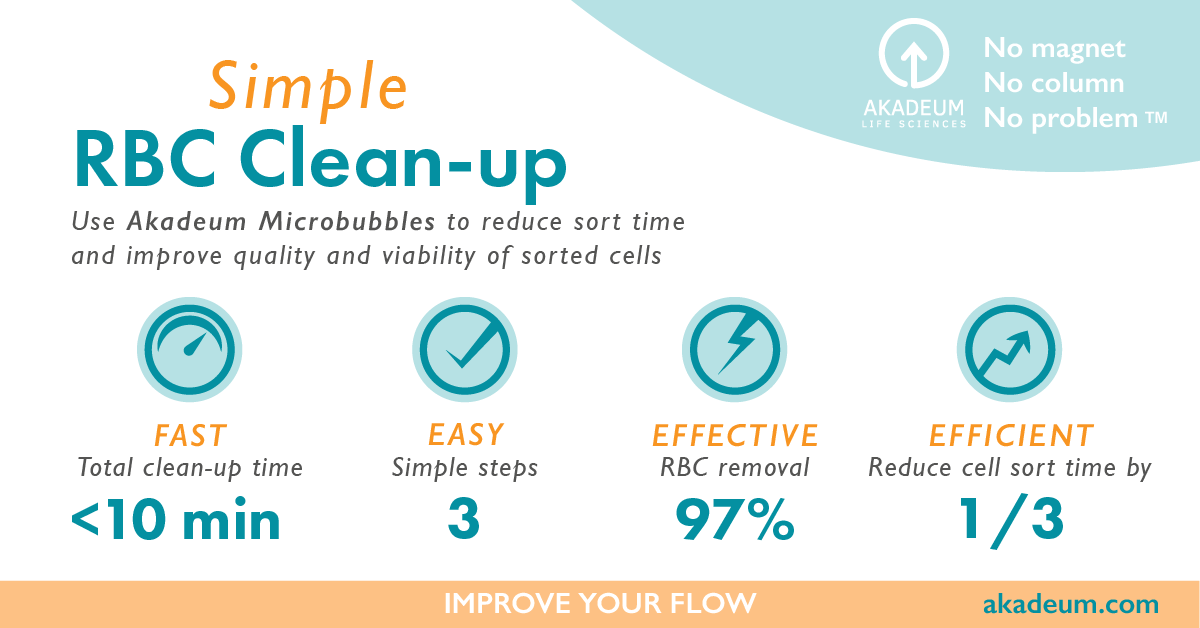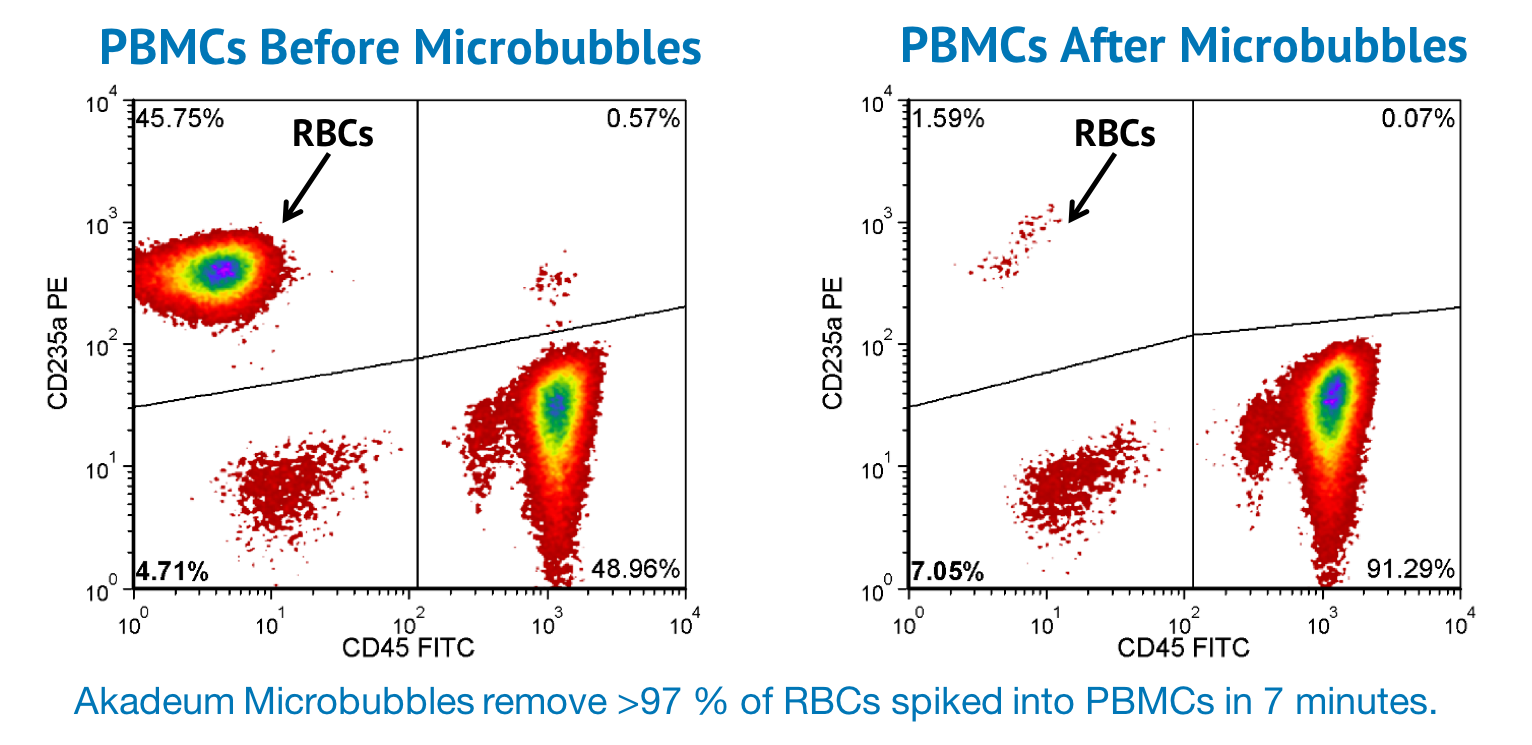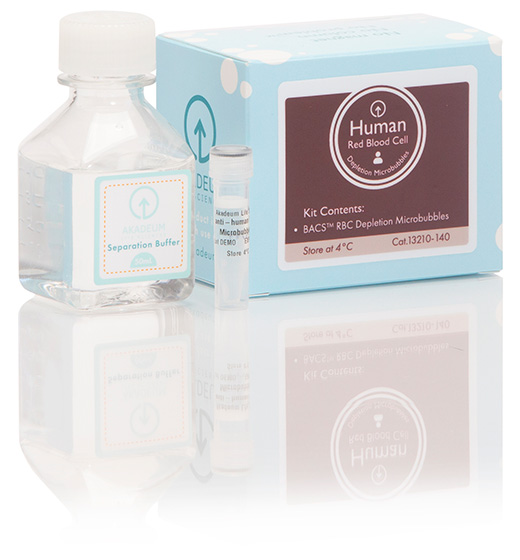View our Buoyant Microbubble Cell Separation Products
Red Blood Cell (RBC) Depletion Products
Akadeum microbubble products offer a new way to approach red blood cell depletion. Our buoyancy-activated technology is an innovative alternative to traditional blood separation techniques, significantly reducing costs, saving time, and simplifying workflows—all while improving the quality and viability of sorted cells.
Interested? Download the RBC App Note to learn more or read our article on human RBC depletion vs. mouse RBC depletion.
Available RBC Depletion Kits and Solutions
Akadeum’s RBC depletion microbubbles are designed to clean up samples with significant red blood cell contamination. Find the product that’s right for you today.
What Is Red Blood Cell Depletion?
The process of depletion is when a single cell type, such as red blood cells, is removed from a biological sample.
For example, human peripheral blood mononuclear cells (PBMCs) are often used for studying immunological functions like cellular surface marker expression and cytokine production. The removal of RBCs from PBMCs qualifies as RBC depletion.
As a critical part of sample preparation, RBC depletion is intended to clean up red blood cell contamination in biological samples, such as in bone marrow or dissociated tissue samples. The presence of high quantities of RBCs can create background interference in assays and reduce the accuracy of downstream analysis. For some applications (including simple and fast removal of residual RBCs), RBC depletion may be required for full functionality.
After RBC depletion, a cell sample is ready to be separated into specific cell subsets or otherwise undergo further processing.
Types of Red Blood Cell Depletion Methods
There are several techniques used for depleting red blood cells in a sample. Typical methods include the following:
- Ammonium chloride lysis
- Density gradient techniques
- Hypotonic lysis
- Immunomagnetic cell separation
- Sedimentation
However, these techniques may leave behind residual RBCs in the final fraction due to disease state or poor preparation. Some methods require several centrifugation steps or long incubation periods. They also may not work well with small volumes or with frozen samples.
So, what’s a researcher to do? Look no further: Microbubbles are here to help.
What Is the Best Red Blood Cell Depletion Method?
Microbubbles are an excellent alternative to typical RBC depletion methods. These microbubbles, based on innovative buoyancy-activated cell sorting (BACS™) technology, capture target cells and quickly float them to the surface of a liquid sample for removal.
Let’s take a look at the highlights.
High Purity
By making cells float that would otherwise sink, microbubbles allow targeted cells to be isolated to a high level of purity. This technology is especially effective when it comes to RBC depletion: Microbubbles are an excellent targeting molecule for capturing RBCs.
No Magnet or Column Required
When RBC depletion microbubbles are added to a biological sample, they engage RBCs and rapidly lift the unwanted cells to the top of any container, regardless of shape or size. No magnets or column is required, eliminating the cost of purchasing and storing such materials.
You can also run multiple samples at the same time—all without additional equipment.
Rapid and Easy Cell Isolation
Buoyancy-activated microbubble technology is easy to use and significantly reduces RBC clean-up time. Since the entire separation is performed within a standard laboratory tube, workflows are simplified. The entire process takes less than 10 minutes.
They’re compatible, too: Use microbubbles with the downstream method of your choice.
Gentle Cell Sorting
Red blood cell depletion microbubbles offer a gentler cell separation approach. There are no harsh and variable magnetic forces. Just microbubbles that target and float unwanted RBCs.
When your samples require more sensitivity than other RBC depletion techniques provide, microbubbles are an alternative solution.
Improved Cell Viability
Microbubbles have no negative effect on cell viability. And, in some cases, microbubbles are shown to be more effective than other RBC depletion methods. When compared to a sample treated with an ammonium chloride lysis buffer, a sample treated with Akadeum Human RBC Depletion Microbubbles performed marginally better than the former.
Akadeum Microbubbles Are the Most Effective Method for RBC Depletion
Akadeum RBC depletion microbubbles are a simple, effective way to remove unwanted RBCs from biological samples. Our innovative BACS™ technology reduces sorting times, produces highly purified cells, and saves resources.

Our customers agree:
A 10-minute Akadeum prep saved me 6 hours of sort time. – Harvard researcher
If you want to improve the quality and viability of sorted cells while drastically saving time and reducing costs, give Akadeum RBC Depletion Microbubbles a try.
Test Study: Akadeum Human RBC Depletion Microbubbles
When put to the test, Akadeum Human Red Blood Cell Depletion Microbubbles removed more than 97% of RBCs spiked into PBMCs in just 7 minutes. See the results for yourself in this comparison of a sample before and after RBC depletion:




